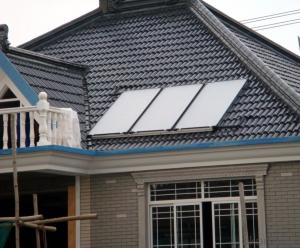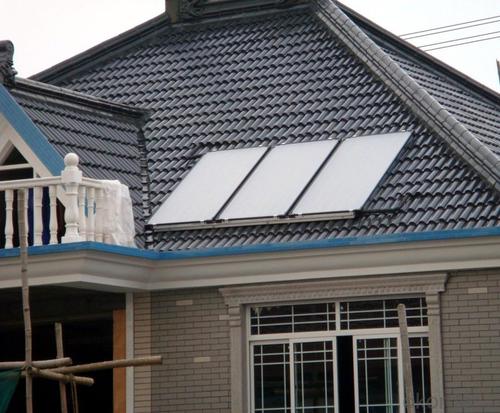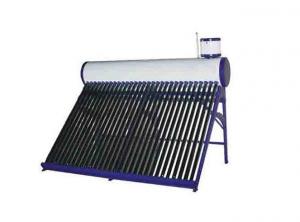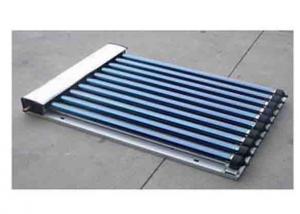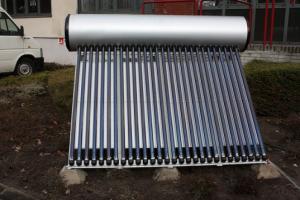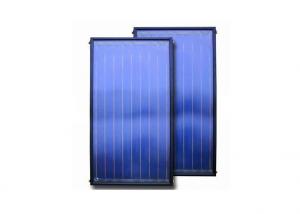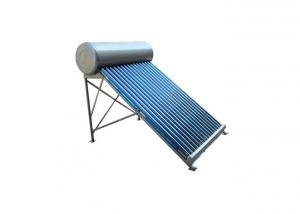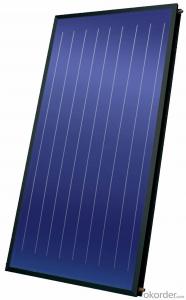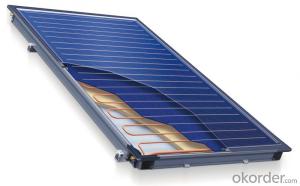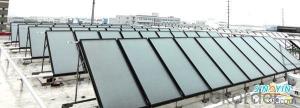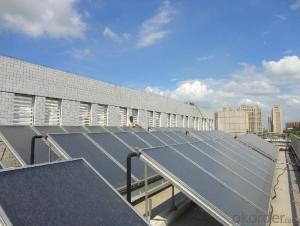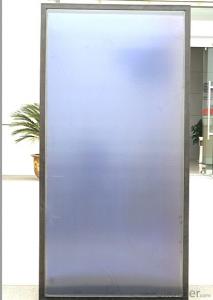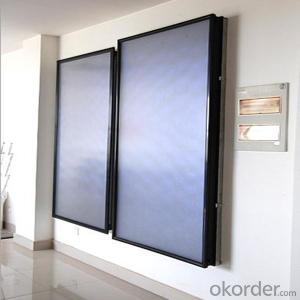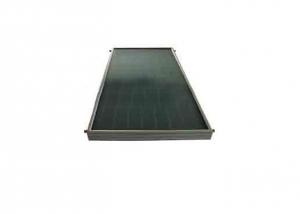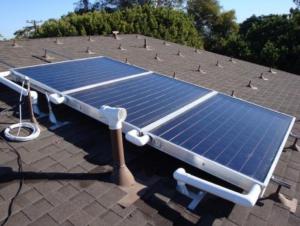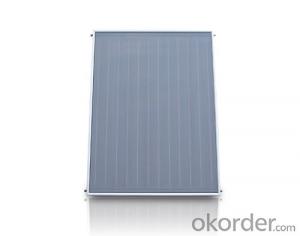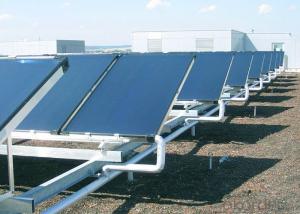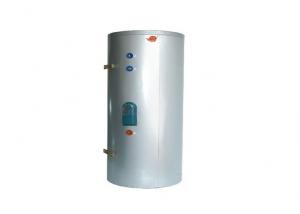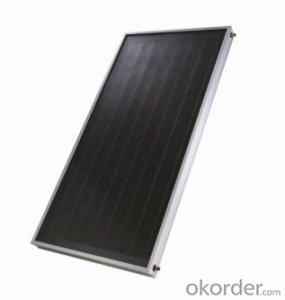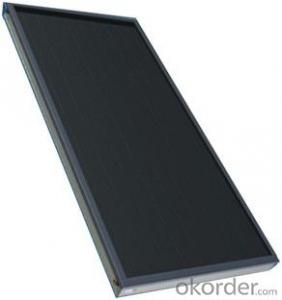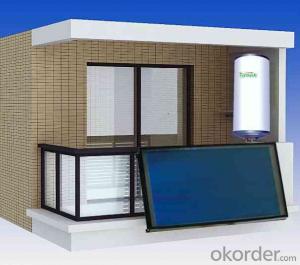Efficient Sunshore Balcony Type Flat Plate Solar Thermal Collectors
- Loading Port:
- Shanghai
- Payment Terms:
- TT OR LC
- Min Order Qty:
- 500 pc
- Supply Capability:
- 10000 pc/month
OKorder Service Pledge
OKorder Financial Service
You Might Also Like
flat plate solar thermal collectors :
1) Cover a window on heat pipe solar collector, has better appearance.
2) Reliable and efficient twin-glass solar tubes
3) Copper heat pipes for rapid heat transfer
4) Easy plug-in installation
5) Free maintenance
6) Work pressure: 8bars
7) Stable solar conversion during the day
8) The perfect solar collector for domestic solar water heater systems
9) Ideal for commercial solar water heating applications.
10) Has got certificate EN12975 & Solar Keymark.
How it works:
1) Connect with pressure water tank and workstation. Water is circulated through the header via intermittent pump cycling. Each time the water circulates through the header, the temperatures is raised by 5-10°C. Throughout the day, the water in the tank is gradually heated.
2) Solar absorption: solar radiation is absorbed by the solar tubes and converted into heat.
3) Solar heat transfer: heat pipes conduct the heat from within the solar tube up to the header pipe
Product information:
This kit has all the necessary elements to be interconnected ,guaranteeing a right operation and long
useful life with high performance. Green Product: use clean energy-solar & no poisonous metals, bring
health to life.Its installation is fast,easy,without any type of maintenance and has several options in harmony
with any type of roof.
1) The flat plate absorber collector is made of red copper or copper & aluminum complex ; the crust uses
anodized aluminum alloy frame material of high strength ,with airflow design
2) Tank Include:1.5/2.0/2.5 KW electric Heating element , T&P Valve ;Sensor,One way valve,drain valve
3) The insulating layer uses polyurethane bulk bubble and has a good effect of temperature preservation
4) The product successfully carries out the installation of separation according to fabricating yard and is
harmoniously blended with architecture
5) The equipments of separated solar water heater is composed by heat collector, storage tank, electric
control device, hot water mix unit and fittings for circulation and installation
- Q: Can solar collectors be used to generate electricity during nighttime hours?
- No, solar collectors cannot generate electricity during nighttime hours as they rely on sunlight for energy.
- Q: Can solar collectors be used for heating greenhouse irrigation systems?
- Yes, solar collectors can be used for heating greenhouse irrigation systems. Solar collectors can capture sunlight and convert it into heat energy, which can then be used to warm water or air that is circulated through the greenhouse irrigation system. This can help maintain optimal temperatures for plant growth and reduce the need for traditional heating methods, ultimately making the system more sustainable and cost-effective.
- Q: How long does it take to install a solar collector system?
- The time it takes to install a solar collector system can vary depending on various factors such as the size and complexity of the system, the experience of the installation team, and the specific requirements of the site. However, on average, a typical residential solar collector system installation can typically be completed within a few days to a couple of weeks. Commercial or larger-scale installations may take longer due to their complexity and the need for additional planning and coordination.
- Q: Can solar collectors be used in biomass power plants?
- Yes, solar collectors can be used in biomass power plants. They can be employed as a supplementary or alternative source of heat to increase the efficiency of biomass combustion and steam production. This hybrid system allows for a more sustainable and renewable energy generation process.
- Q: Can solar collectors be used in combination with agricultural irrigation systems?
- Yes, solar collectors can be used in combination with agricultural irrigation systems. Solar collectors can provide the energy needed to power irrigation pumps, which reduces reliance on fossil fuels and decreases operational costs. This sustainable solution harnesses solar energy to pump water and supports the efficient and eco-friendly irrigation of agricultural lands.
- Q: Can solar collectors be used for generating electricity on cruise ships?
- Yes, solar collectors can be used for generating electricity on cruise ships. By harnessing the power of the sun, solar collectors can convert sunlight into electrical energy, providing a sustainable and renewable source of power for various onboard systems and amenities.
- Q: What is the difference between solar collectors and solar panels?
- Solar collectors and solar panels are both devices used to harness the energy from the sun, but they serve different purposes. Solar collectors are specifically designed to absorb and transfer heat from the sun, usually to heat water or air for space heating or hot water purposes. On the other hand, solar panels, also known as photovoltaic (PV) panels, are used to convert sunlight directly into electricity by utilizing the photovoltaic effect. Therefore, the main difference lies in their functionality: solar collectors primarily generate heat, whereas solar panels generate electricity.
- Q: What is the best orientation for solar collectors?
- The best orientation for solar collectors is typically facing south, as this allows them to receive the maximum amount of sunlight throughout the day. However, the optimal orientation may vary depending on the specific location and desired performance of the collectors.
- Q: Can solar collectors be used in areas with limited access to technical standards?
- Yes, solar collectors can be used in areas with limited access to technical standards. Solar collectors are relatively simple and low-tech devices that can be adapted to meet the specific needs and conditions of different regions. They do not necessarily require advanced technical standards or complex infrastructure for installation and operation. With proper training and support, communities with limited access to technical resources can still successfully implement and benefit from solar collectors as a renewable energy solution.
- Q: Can solar collectors be used for industrial applications?
- Yes, solar collectors can be used for industrial applications. They can be integrated into industrial processes to generate heat or electricity, providing a sustainable and cost-effective alternative to traditional energy sources. Solar collectors can be employed in various industries such as manufacturing, agriculture, and chemical processing to meet their energy needs and reduce their carbon footprint.
Send your message to us
Efficient Sunshore Balcony Type Flat Plate Solar Thermal Collectors
- Loading Port:
- Shanghai
- Payment Terms:
- TT OR LC
- Min Order Qty:
- 500 pc
- Supply Capability:
- 10000 pc/month
OKorder Service Pledge
OKorder Financial Service
Similar products
Hot products
Hot Searches
Related keywords
